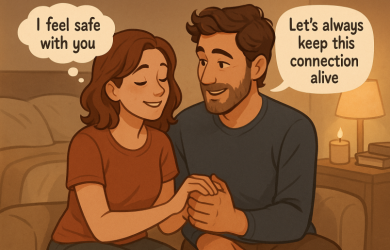10 Ways to Deal if You’re Insecure About Your Sexuality

Unlock Daily 30-Sec Tips for a Happier Relationship
👉 Subscribe FREEKey Takeaways
Marriage.com AI Quick Summary
In a world where discussions about sexuality are becoming more open yet remain nuanced, many individuals find themselves grappling with insecurities about their sexual identity, preferences, or performance.
It is normal to seek guidance and support for those insecure about their sexuality. Addressing sexual insecurity is not just about improving one’s sex life; it’s about cultivating a deeper understanding and acceptance of oneself.
What does it mean to be insecure about your sexuality?
Being insecure about your sexuality can manifest in various ways, including doubts about sexual orientation, anxiety over sexual desires, or fears regarding sexual performance.
It might also involve feelings of shame or inadequacy stemming from societal norms or personal expectations. This insecurity can significantly impact one’s mental health and relationships, making it crucial to address.
A study examined sexual satisfaction and mental health differences based on relationship status and gender among 1682 Spanish adolescents and young adults (14–29). Findings reveal greater challenges in satisfaction and mental health for singles and women. Relationship status amplifies the link between sexual satisfaction and mental health, especially in current partnerships.
Sex therapist Danica Mitchell suggests,
While insecurities about sexuality are associated with young adults, they can happen at any age.
10 ways to get rid of sexual insecurity for a better sex life
Addressing sexual insecurity is not merely about enhancing one’s sex life; it’s fundamentally about nurturing a deeper sense of self-worth and acceptance. For many, feeling insecure about sexuality is a significant barrier to experiencing intimacy fully.
Here are 10 strategies designed to mitigate these insecurities, promoting a more fulfilling and confident sexual journey.
1. Understand the root of your insecurities
Start by identifying what makes you feel insecure about your sexuality. Are they societal expectations, past experiences, or personal beliefs? Understanding the source of your insecurity can be enlightening and is the first step toward addressing it. Remember, recognizing and acknowledging your feelings is a sign of strength, not weakness.
2. Communicate openly with your partner
Communication is key when dealing with feelings of being insecure during sex. Discussing your fears and desires with your partner can help mitigate anxieties and build a stronger, more empathetic connection. Be honest about what you need to feel safe and valued in your intimate moments.
3. Educate yourself
Knowledge is power. Educating yourself about sexual health, different sexual orientations, and the spectrum of sexual desires can help demystify aspects of sex that may be contributing to your insecurities. The more you know, the less intimidating and more normal your feelings and questions will seem.
4. Seek professional support
If you find yourself thinking, “I’m too insecure to have sex,” it might be time to seek help from a therapist or sexologist. Professionals can offer strategies and insights that are tailored to your specific concerns, helping you understand and work through your insecurities in a supportive environment.
5. Practice self-love and acceptance
Cultivating a positive body image and self-esteem plays a crucial role in overcoming feelings of being insecure about your sexuality. Engage in activities that make you feel good about yourself, and practice self-love through affirmations and self-care. Remember, confidence starts from within.
A study highlighted that clinically evaluated adolescents with strong self-esteem exhibit reduced symptoms of anxiety, depression, and attention issues over time. This suggests that self-esteem serves as a protective factor, bolstering resilience against these symptoms.
6. Explore at your own pace
If insecurity and sex feel closely linked to you, consider exploring your sexuality at your own pace. There’s no rush to meet any milestones. Discovering what you like, dislike, and feel comfortable with can be an empowering journey of self-discovery.
7. Challenge negative thoughts
When you catch yourself trapped in a cycle of negative thinking about being insecure about your sexuality, challenge these thoughts. Ask yourself if they’re truly accurate or based on cognitive distortions. Replacing negative thoughts with positive affirmations can shift your mindset over time.
8. Set boundaries and stick to them
Understanding your boundaries and communicating them clearly to your partner is crucial. If you’re insecure about sex, knowing your limits and ensuring they’re respected can create a safer and more comfortable experience, helping to build trust and reduce anxiety.
Watch this video where licensed psychotherapist Michelle Farris shares how to set healthy boundaries for yourself:
9. Focus on emotional intimacy
Sometimes, feeling insecure about your sexuality can stem from a lack of emotional connection. Focusing on building emotional intimacy with your partner can enhance your sexual relationship, making physical intimacy more comfortable and enjoyable.
10. Give yourself time and grace
Overcoming sex insecurities doesn’t happen overnight. It’s a process that requires patience, time, and compassion toward yourself. Celebrate small victories and understand that progress might be slow but meaningful.
FAQs
Sexual health and wellness can usually raise questions about insecurities, confidence, and overcoming personal hurdles. Here are answers to some frequently asked questions on these topics:
-
How can I differentiate between normal sexual insecurities and more serious sexual dysfunctions or disorders?
Normal sexual insecurities often stem from self-doubt and can vary in intensity, usually improving with reassurance and self-care. In contrast, sexual dysfunctions or disorders typically persist over time, significantly impairing one’s ability to enjoy sexual activity, and often require professional intervention for improvement.
-
What role does past trauma or negative experiences play in contributing to sexual insecurity, and how can I address these issues effectively?
Past trauma or negative experiences can deeply impact one’s sexual confidence, leading to either anxiety and avoidance or hypersexuality. Addressing these issues effectively involves acknowledging the trauma, seeking professional counseling, and possibly engaging in therapeutic practices like cognitive-behavioral therapy (CBT) to work through these experiences in a safe, supportive environment.
-
Are there any specific exercises or activities I can do to build sexual confidence and self-esteem on my own?
Building sexual confidence and self-esteem can start with self-exploration and education. Exercises like journaling about your desires and fears, practicing body positivity through affirmations, and exploring your own body through self-touch can promote a better understanding and appreciation of your sexuality, enhancing confidence.
-
How can I support my partner in overcoming sexual insecurities without inadvertently reinforcing negative beliefs or behaviors?
Supporting your partner involves open, non-judgmental communication and reassurance. Encourage discussions about fears and desires, offer positive reinforcement, and be patient. Suggesting professional help and participating in therapy sessions together can also be beneficial, ensuring you manage this journey in a supportive, constructive manner.
In a nutshell
Feeling insecure about your sexuality can be a common experience, but it doesn’t have to define your sexual life. By embracing self-acceptance, seeking knowledge, communicating openly, and practicing self-care, individuals can work toward overcoming these insecurities.
Remember, your journey toward a more secure sexual identity is personal and unique, and there’s no “right” way to feel. With compassion, understanding, and time, it’s possible to cultivate a healthier and more fulfilling sexual life.
 Tips
Tips
Write your tip or submit a video tip
All tips are reviewed before the publishing.
Share this article on
Want to have a happier, healthier marriage?
If you feel disconnected or frustrated about the state of your marriage but want to avoid separation and/or divorce, the marriage.com course meant for married couples is an excellent resource to help you overcome the most challenging aspects of being married.
Recent Articles
Related Quizzes
Unlock Daily 30-Sec Tips for a Happier, Healthier Relationship
👉 Subscribe FREE on YouTube We'd love your feedback!
We'd love your feedback!
 Expert Q&A
Expert Q&A
Ask your question related to this topic & get the support you deserve from experts.





















 Thanks for your feedback!
Thanks for your feedback!